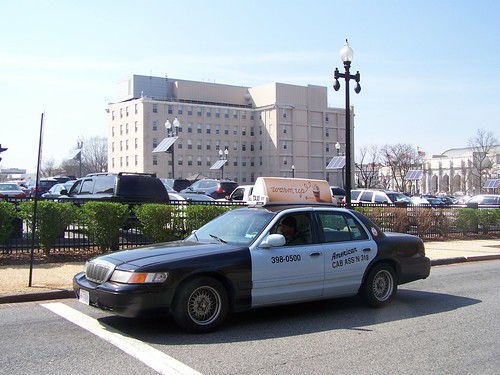More on the taxi medallion issue

I wrote about this last week, in "Taxi medallions as a grant of wealth." In the current issue of themail, the e-letter on DC good government issues, Qawi Robinson writes about taxi medallions, tying the issue up with other initiatives ranging from bike lanes to paying 5 cents for plastic bags.
This is the paragraph that got my dander up:
In recent weeks, there has been much turmoil regarding the “Professional Taxicab Standards and Medallion Establishment Act of 2011,” proposed by Councilmembers Barry, Thomas, and Michael Brown, cosponsored by Councilwoman Alexander, and introduced by Former Councilmember John Ray.The latter of the group, seems to be on an undisclosed retainer by a coalition of taxi fleet owners. For folks who don’t ride in taxis, this bill may seem mundane, but at the heart of it is a direct attack on small and independent business owners. Only in DC government can such an attack on free enterprise exist, and if the recent track record of the council and mayor holds true, citizens should expect more attacks on free enterprise and free thought. I say this because much of DC policy in the recent administrations has been borrowed,” “stolen,” and mimicked from other US cities — scaled down vehicle inspections, bike share, bus and bike lane vehicular restrictions, five-cent bag bill, and taxi meters are just a few examples. The argument for the medallion bill is similar, as proponents are championing Boston, New York, Philadelphia, and other cities for implementing this type of legislation.
I realize that one of the only ways to fight this is to focus on the fact that there is no transportation plan--at least not a current one--for managing the DC taxicab industry. As Philip Stephens wrote in the Financial Times:
The best test of public service reform is how well proponents answer a prior question: what is the problem they want to solve?
The City Council shouldn't be taking up this issue without a decent study of the industry, its current conditions, how it functions elsewhere, gaps in service, opportunities to do better, etc.
You can be in favor of bike lanes, bike sharing, and other programs such as bag "taxes" for a variety of reasons. Bike lanes and bike sharing programs make a lot of sense in terms of congestion management, active transportation practices which promote health, etc.
Regardless of what Qawi Robinson writes, it's a distraction and a mistake to link these kinds of policies with the specter of the creation of a taxi medallion system. There is no connection. None. And if he wants to succeed in opposing the proposed taxi medallion system, he and others need to be hyper-focused on that fact.
Frequently, I lament that DC doesn't have a master transportation plan comparable in scope to that of Seattle or Arlington County. Such a plan should include coverage of the taxicab industry. If you look at the Taxicab Commission webpage, it is very glaring that there is no overall plan for the taxicab element of DC's transportation system. The proposed taxicab legislation should not be approved in advance of the creation of an overall transportation plan for this industry.
It's worse than we think, because the reality is that the proposed taxi medallion system is a form of political entrepreneurialism, where the proponents convert a license costing a few hundred dollars every couple years to a permanent license which for all intents and purposes can't be revoked, into an asset worth hundreds of thousands of dollars, where the value of the asset is not reaped by the citizens/DC Government, but by those who have the privilege of being licensed.
This legislation isn't about creating and supporting a free market, it's about taking public assets and privatizing them, where all the monetary rewards of an increase in the value of the asset are solely reaped by the licensee.
Right now, the city has few barriers to entry to taxicab licensing. It's true that this makes it hard for drivers to make a living because supply tends to be greater than demand as a result. This problem has been accentuated by the change to a meter-based system, which no longer allows multiple trips per run, unlike the old zone system. (Carrying multiple riders should be encouraged, as it is a more efficient use of the taxi.)
However, this can be addressed without monetizing the value of the licenses and making various taxicab interests wealthy as a result of legislative diktat. The meter system can be adjusted so that taxicabs can carry multiple fares. A ceiling on the number of cabs could be imposed and adjusted annually. Quality standards can be imposed.
A plan could also provide other incentives/concepts/methods to ensure service in underserved neighborhoods such as shared taxi services/jitneys, running regular routes, and maybe with some transportation subsidy (such services operate in many communities, even in Montreal, which has 3x the population of DC, where it isn't cost-effective to provide bus service). Similarly, concerns about the cost of the MetroAccess system could also be addressed, and the taxi industry could be involved in providing rides at less cost--further providing support for taxi service in underserved areas.
(See "Metro tries to rein in ridership, costs of MetroAccess -- a generous ride comes to an end" from TBD about problems with the paratransit system.)
In short, a plan for the taxicab industry and its operation in DC should be the first order of business, and the situation evaluated, before the City Council enacts substantive change to how the industry is operated.



0 Comments:
Post a Comment
<< Home